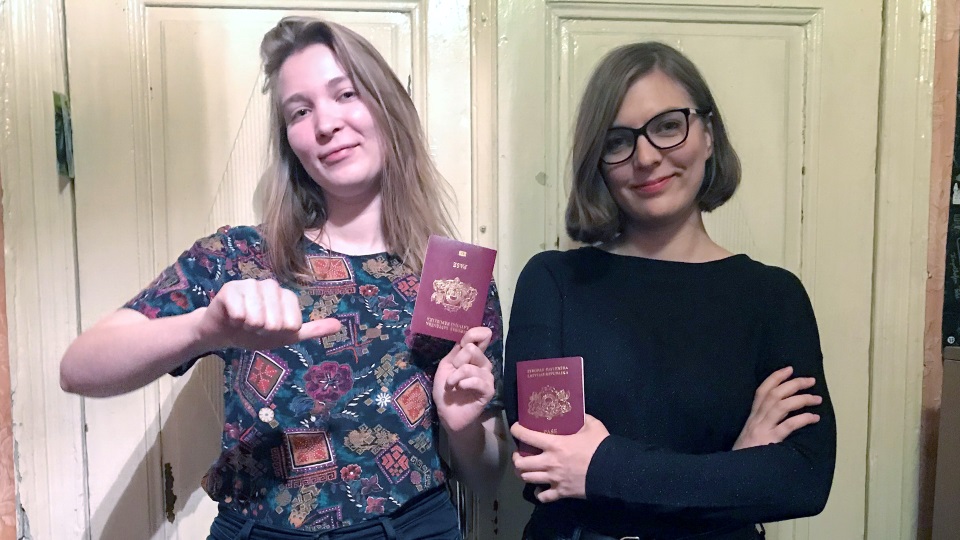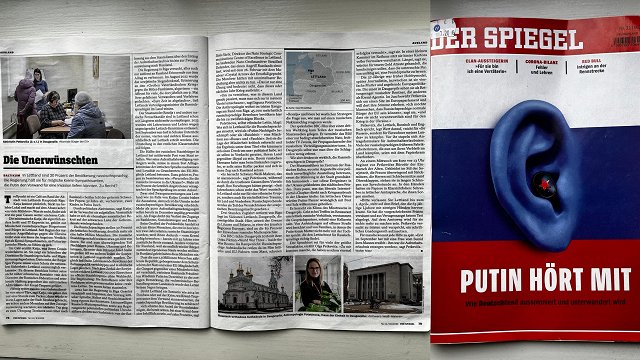Ksenija, citizen
About a month and a half after the oath ceremony, a letter arrived from the migration service. I was invited to finalize my passport. It was Tuesday, and I went to the Branch Office No 2 of the Office of Citizenship and Migration Affairs, however, it was crowded.
I could see no end to the queue and just two or three people were serving clients. The same happened next day. Some friends said I should apply to finalize my passport on the Latvija.lv website, but after a human error, which a client service rep was unable to fix, I returned to the office on Thursday, and waited out the line.
What does 'non-citizen' mean?
On October 15, 1991 the Supreme Council (the interim parliament) granted citizenship to Latvians who were citizens during the inter-war period, and their offspring.
As a result, a third of Latvian residents who were largely Soviet-era immigrants became non-citizens with an ambiguous legal status. During the last 25 years, 150,000 non-citizens have been granted citizenship under the naturalization program. About 250,000 are still non-citizens and don't enjoy certain rights, like the right to vote or hold certain public offices.
Read more about the historical context HERE.
I had to make an application so that I would be made a citizen via a Cabinet ruling. He sent an application, and I hadn't even become bored by the time my request was granted.
There's a nice touch in that, upon becoming a citizen, the oven-fresh citizen can get their passport on an express basis, whilst paying the regular fee. On Friday I returned to the office and I was handed maroon-colored testimony to the fact that I am now a citizen of Latvia and the EU, along with and ID card.
Becoming a citizen was not difficult or degrading, and it's realistically possible to go through the process. Of course it could be simpler and faster, but the aftertaste is neutral. Nevertheless, I still have many questions regarding Latvian law.
During naturalization, I discovered that sometimes non-citizens are likened to third-country nationals, like if they want to buy land or real estate. Meanwhile, French nationals, for example, can vote in the regional elections, in stark difference to non-citizens who may have spent their whole life in the country.
I could go on and on. But honestly, I don't understand why, take, some grand-dad Vitaliy can't buy a country house and become a farmer in his old days? Why must he ask for municipal confirmation, or prove he can speak Latvian, to be allowed to grow veggies and chickens? Or, take Pierre, a French national in Latvia through the Erasmus exchange program--why does he, according to the law, know how Riga should develop than one Katya who has lived here her whole life?
What surprises me most in this situation is that several Latvian officials obsessively proclaim that "non-citizens" are different from the stateless. In Estonia at least, politicians don't seem to hide this fact, and their non-citizens can vote in local elections.
It's just impossible that everywhere else, in the UN statistics, on airline websites, in neighboring Estonia and the documents of the European Parliament non-citizens are called stateless, but only in Latvia they enjoy 'a special status that isn't considered a subset of citizenship'.
In some way it shows that, here, not even the first step has taken to solving the problem, to fully acknowledging non-citizens without 'but'. That's why it was naive of me to expect that the president's offer this year - to grant citizenship to every newborn - would be accepted by the Saeima.
After the parliament shut the proposal down, my conviction - that it's useless to wait for naturalization to become simpler or a citizenship-for-all solution to appear - grew ever stronger. In many ways it spurred me on to acquire citizenship, and I don't regret that. My idealism and the belief that the impossible is possible was shut down, but I am still ready to vote and I still think it's necessary to do that.
When I decided to become a citizen, I expected that the only thin that will substantially change would be my passport. I rose up early in those days and went to the Dome square and spent my weekends home or with my friends. It was not a life full of the unexpected.
But the day when I'm writing this comes after a two-day work trip to Latgale, a first for me. Every morning I go to Zaķusala, to the TV building, and from there I may go to the ends of the world, wherever a story would take me. While some weekends I spend in the company of a Czech documentary filmmaker. He found me thanks to this blog.
Anna, citizen
My last blog entry is dedicated to the memory of former Naturalization Authority head Igors Gorbunovs, who worked to make the system of naturalization more humane.
In a perpetual flow of information, re-broadcast every single day, you turn into a receiver uttering fragmented sentences, thoughts, stories, concepts and discussions. From time to time, attuned to my inner radio band, I grasped a few words from a vast variety of mythologems. 'European values,' it said. But where one could find them, it was hard for me to understand.
There weren't any in the oligarch talks at the Rīdzene hotel.
I did not see any when a 12-year-old girl died in a fire at Rēzekne. Or when Welfare Minister Jānis Reirs discovered, with a surprise, that disabled people can be bereft of their benefits for months on end.
The founding principles of the EU were hard to come by in the variety of stories, that housing is scarce in Riga; that people leave Latvia and refugees do to; that the situation is dire at orphanages, and that social workers are violent against children. It was hard to find any 'European values' in the decisions of those who have power but lose their political clout.
Looking for these 'European values' I spent my time, my conviction and the understanding of what one is supposed to do.
I could have assumed a cynical stance, or one of equanimity. But I didn't want to. I had to change something, and/or go away and stop thinking about what I've left behind in the country where I was born and raised, the country that I love.
When I went off on the road of becoming a citizen, I started looking at society - as a whole, at the country and, globally, at power - with a more thoughtful pair of eyes.
Evidently I had started learning the basics of a civic stance and think about the fate of my city and whether I, as a private person, have anything to do with politics.
It seemed to me that many don't have enough air to breathe in my city, projects are too few and other people, with whom one could exchange news or knowledge, were lacking too. Many of us are greeted by a claustrophobic feeling that we know everyone else and there's not enough space to grow.
All of this leads to a question, "What am I doing here, and why?" And this is not a question bothering only non-citizens. But the most important answer is the one we find for ourselves.
I found my answer a few months ago, when I joined the Free Riga NGO. I was lead to do so by my thoughts about what I could do and where I could make a reality out of the dream I had of working for the public good. For the first time, I found myself in a multicultural society, surrounded by three languages. It was at that moment when I fully accepted my Russian character. The awkwardness was gone-when you use several languages, doors open to you along with possibilities. And it's a great privilege, as after the third language comes the fourth and after that the fifth.
So, somehow, I did join a 'cult' of some sort. But not one based on false promises, or following a Jesus-like person. I see that we're growing and I see the desire to grow in others too. People come to the Maskačka [a Riga neighborhood,-ed.] festival, create a ceramic workshop in an abandoned building or teach others clay modelling.
I see that there are in fact people who want to change the situation and show others that it's possible.
They are through with feeling alienated, a feeling not influenced by having a citizen's or a non-citizen's passport. It doesn't have to do with being able to vote. It's about being a part of a whole, and being able to break down borders.
Despite all the difficulty, the problems and the fears, I do not regret my decision and I'm very happy that me and Ksenija made this gruel. Because during these nine months of naturalization I have been born again, found my place and become happy.
P.S. By way of becoming a citizen, I have also shed my fears and preconceptions about Russia. I think I'll be visiting there more often, and Europe and other parts of the world. It may well be, let's say, that I've become... a citizen of the world.
Special thanks to our editor Aleksandrs Krasnitskis, thanks to whom our project saw the light of day and we didn't stop when we were just halfway there (or earlier). And thanks to the migration service employees for their understanding, their magnanimity and their love of what they do.





























